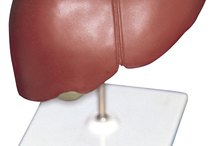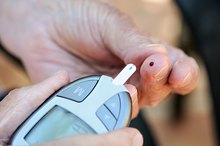What Are the Causes of Low Iron Levels in a Low Blood Count & Weight Loss?
Numerous conditions can cause low iron levels in a low blood count and weight loss. According to Dr. Dicken Weatherby, a naturopathic physician and author of the textbook "Blood Chemistry and CBC Analysis," total serum iron--the total amount of iron in your blood--is a measure of the iron bound to blood, or serum, protein. Certain medical conditions may cause you to experience decreased levels of iron in your blood and decreased weight at the same time.
Iron Deficiency Anemia
Iron deficiency--the most common cause of anemia worldwide--can cause low iron levels and weight loss. Iron deficiency often results in decreased healthy red blood cells, or anemia. According to the University of Maryland Medical Center, your body needs iron to form hemoglobin. Iron is mostly stored in your body in the form of hemoglobin, although about 30 percent of your iron is also stored as ferritin and hemosiderin in your bone marrow, spleen and liver. Several factors can cause iron deficiency anemia, including decreased consumption of iron, growth spurts and pregnancy, gastrointestinal tract abnormalities and blood loss. Common signs and symptoms associated with iron deficiency anemia include decreased serum iron and healthy red blood cells, unintended weight loss, loss of appetite, fatigue, weakness, shortness of breath, headache, dizziness, irritability, brittle nails and irregular heartbeat.
- Iron deficiency--the most common cause of anemia worldwide--can cause low iron levels and weight loss.
- Several factors can cause iron deficiency anemia, including decreased consumption of iron, growth spurts and pregnancy, gastrointestinal tract abnormalities and blood loss.
Chronic Renal Failure
Fatty Liver & Anemia
Learn More
Chronic renal failure, also known as chronic kidney failure, can cause low serum iron levels and unintended weight loss. MayoClinic.com states that chronic renal failure is the loss of kidney function over time. Your kidneys filter metabolic waste products and excess fluids from your blood, which are then voided in your urine. Chronic renal failure can damage your kidneys, causing harmful levels of fluid and waste products to accumulate in your body. Weatherby states that chronic renal failure can cause decreased total serum iron levels. Other common signs and symptoms associated with chronic renal failure include weight loss, loss of appetite, fatigue, nausea, vomiting, sleep problems, decreased mental sharpness, muscle cramps, swelling of your feet and ankles and unrelenting itching. According to MayoClinic.com, anemia, cardiovascular disease and weak bones are possible complications associated with chronic renal failure.
- Chronic renal failure, also known as chronic kidney failure, can cause low serum iron levels and unintended weight loss.
Vitamin C Deficiency
Vitamin C deficiency is a nutrition-related cause of decreased total serum iron levels and unintended weight loss. According to the Merck Manuals website, vitamin C, also known as ascorbic acid, helps your body form collagen, carnitine, certain hormones and amino acids. Vitamin C is crucial for proper wound healing, and it facilitates recovery from burns. Vitamin C is an antioxidant, supports your body's immune function and helps your body absorb iron. Without sufficient amounts of vitamin C, you can become iron deficient. Common signs and symptoms associated with vitamin C deficiency include low serum iron levels, weight loss, weakness, irritability and diffuse muscle and joint pain throughout your body. The Merck Manuals website states that vitamin C deficiency-related symptoms usually manifest after weeks to months of vitamin C depletion. Vitamin C deficiency can be prevented by consuming five servings of most fruits and vegetables every day.
- Vitamin C deficiency is a nutrition-related cause of decreased total serum iron levels and unintended weight loss.
Related Articles
References
- MayoClinic.com: Chronic Kidney Failure
- Merck Manuals: Vitamin C
- Camaschella C. Iron deficiency: new insights into diagnosis and treatment. Hematology Am Soc Hematol Educ Program. 2015;2015:8-13. doi:10.1182/asheducation-2015.1.8
- Pawlak R, Berger J, Hines I. Iron Status of Vegetarian Adults: A Review of Literature. Am J Lifestyle Med. 2016;12(6):486–498. doi:10.1177/1559827616682933
- DRI: Dietary Reference Intakes for Vitamin A, Vitamin K, Arsenic, Boron, Chromium, Copper, Iodine, Iron, Manganese, Molybdenum, Nickel, Silicon, Vanadium, and Zinc. Washington, D.C.: National Academy Press; 2001.
- Alaunyte I, Stojceska V, Plunkett A. Iron and the female athlete: a review of dietary treatment methods for improving iron status and exercise performance. J Int Soc Sports Nutr. 2015;12:38. doi:10.1186/s12970-015-0099-2
- Mirza FG, Abdul-kadir R, Breymann C, Fraser IS, Taher A. Impact and management of iron deficiency and iron deficiency anemia in women's health. Expert Rev Hematol. 2018;11(9):727-736. doi:10.1080/17474086.2018.1502081
- Hegazy AA, Zaher MM, Abd El-Hafez MA, Morsy AA, Saleh RA. Relation between anemia and blood levels of lead, copper, zinc and iron among children. BMC Res Notes. 2010;3:133. Published 2010 May 12. doi:10.1186/1756-0500-3-133
- Qin Y, Melse-Boonstra A, Pan X, et al. Anemia in relation to body mass index and waist circumference among Chinese women. Nutr J. 2013;12:10. doi:10.1186/1475-2891-12-10
- Cleveland Clinic. Leukemia. Updated October 31, 2016.
- Merck Manual Professional Version. Iron Deficiency Anemia. Updated July 2018.
- Johns Hopkins Hospital. Iron-Deficiency Anemia.
- Abu-Ouf NM, Jan MM. The impact of maternal iron deficiency and iron deficiency anemia on child's health. Saudi Med J. 2015;36(2):146–149. doi:10.15537/smj.2015.2.10289
- National Institute of Diabetes and Digestive and Kidney Diseases. Hemochromatosis. Updated March 2014.
Resources
- "Blood Chemistry and CBC Analysis"; Dicken Weatherby, N.D.; 2002
Writer Bio
Martin Hughes is a chiropractic physician, health writer and the co-owner of a website devoted to natural footgear. He writes about health, fitness, diet and lifestyle. Hughes earned his Bachelor of Science in kinesiology at the University of Waterloo and his doctoral degree from Western States Chiropractic College in Portland, Ore.









